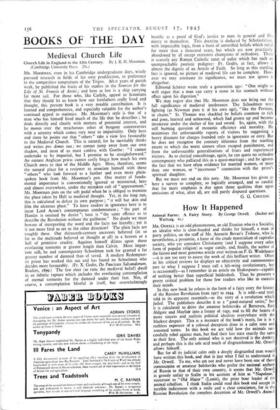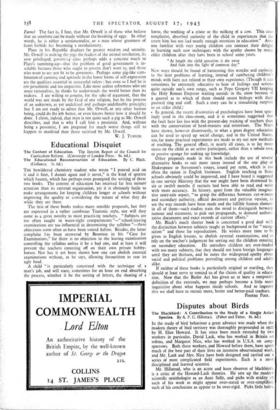How It Happened
MR. ORWELL is an odd phenomenon, an old Etonian who is a Socialist, an idealist who is dear-headed and thinks for himself, a man of party politics, on the staff of Mr. Aneurin Bevan's Tribune, who is, nevertheless, a pessimist, a hater of the crude materialism of capitalist society, who yet considers Christianity (and I suppose every other form of popular religion) as sugar candy, and, finally, the author of the fairest and most generous article ever written on P. G. Wodehouse —it is not too easy to assess the work of this brilliant writer. Often in his critical reviews he displays an objectivity and commonsense rare in what I suppose I must call a left-wing revolutionary, but is occasionally—as I remember in an article on Shakespeare—capable of nothing better than superficial balderdash. Thus he presents a pretty critical problem for those few readers who like to exercise their minds.
In this new book he relates in the form of a fairy story the history of the Russian Revolution from 1917 to 1944- It is told-,-and truly told in its apparent essentials—as the story of a revolution which failed. The publishers describe it as a " good-natured satire," but it is calculated to drive the amateur bolsheviks of Battersea, East Aldgate and Mayfair into a frenzy of rage, and to fill the hearts of more sincere and realistic political idealists everywhere with the blackest despair. This is a measure of the book's merit, for it is a ruthless exposure of a colossal deception done in a calm tone and
reasoned terms. In this book we are told how the animals suc- cessfully rebel against man, but find their last state exactly the same as their first. The only animal who is not deceived is the donkey, and perhaps this is the sole acid touch of disgruntlement Mr. Orwell allows himself..
But for all its judicial calm only a deeply disgruntled man would have written this book, and that is just what I fail to understand in Mr. Orwell. To me, who am not and never have been one of those 'communists or amateur- bolsheviks who prefer the national anthem of Russia to that of their own country, it seems that Mr. Orwell is grossly unfair to Stalin in his account of him as , "'Napoleon," successor to " Old Major " (Lenin), the prize boar leader of the .animal rebellion. I think Stalin could read this book and accept its -terrible indictment with a smile and a clear conscience, for is the Russian Revolution the complete deception of Mr. Orwell's Anintil
Farm? The fact is, I fear, that Mr. Orwell is of those who believe that an omelette can be made without the breaking of eggs. In other words, he is either a sentimentalist, or a man whose greatness of heart forbids his becoming a revolutionary.
Plato in his Republic displays far greater wisdom and serenity. Mr. Orwell in making the pigs the leaders of the animal revolution, its new privileged, govern:t e class perhaps adds a concrete touch to Plato's summing-up—that the problem of good government is in- soluble because those who ought to govern don't want to, and those who want to are not fit to be governors. Perhaps some pig-like com- bination of cunning and aptitude in the lower forms of self-expression are the qualities essential in successful rulers ; but even so I feel he is too pessimistic and too impatient. Like most ardent reformers who are mere rationalists, he thinks he understands the world better than its makers. I am willing to assume, for the sake of argument, that the world was not made by the God of any religion, but by the process of an unknown, as yet undefined and perhaps undefinable principle; but I am not ready to admit that Mr. Orwell, or any other human being, could do the job better, or even knows better how it should be done. I claim, indeed, that man is not quite such a pig as Mr. Orwell describes, and that is why I call him a pessimist. And, without being a pessimist, I am prepared for much worse things still to happen to mankind than those satirised by Mr. Orwell.
W., J. TURNER.



























 Previous page
Previous page